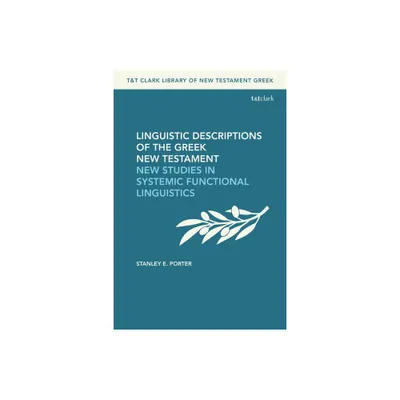Home
The Pronunciation of New Testament Greek: Judeo-Palestinian Greek Phonology and Orthography from Alexander to Islam
Loading Inventory...
Barnes and Noble
The Pronunciation of New Testament Greek: Judeo-Palestinian Greek Phonology and Orthography from Alexander to Islam
Current price: $99.99


Barnes and Noble
The Pronunciation of New Testament Greek: Judeo-Palestinian Greek Phonology and Orthography from Alexander to Islam
Current price: $99.99
Loading Inventory...
Size: Hardcover
*Product Information may vary - to confirm product availability, pricing, and additional information please contact Barnes and Noble
A pioneering, comprehensive study of the pronunciation of Judeo-Palestinian Koine Greek.
How was New Testament Greek pronounced? Often students are taught Erasmian pronunciation, which does not even reproduce Erasmus’s own pronunciation faithfully, let alone that of the New Testament authors. In his new book, Benjamin Kantor breaks a path toward an authentic pronunciation of Koine Greek at the time of the New Testament. To determine historical pronunciation,
The Pronunciation of New Testament Greek
surveys thousands of inscriptions and papyri. Kantor’s work integrates traditional methodology and statistical analysis of digital databases to examine spelling variations in the chosen texts. Kantor covers this cutting-edge approach, the primary sources, and their contexts before explaining the pronunciation of each Greek phoneme individually. Written for interested students and specialists alike, this guide includes both explicatory footnotes for novices and technical analysis for veterans. As the first comprehensive phonological and orthographic study of Judeo-Palestinian Koine Greek,
will be an essential resource for years to come.
How was New Testament Greek pronounced? Often students are taught Erasmian pronunciation, which does not even reproduce Erasmus’s own pronunciation faithfully, let alone that of the New Testament authors. In his new book, Benjamin Kantor breaks a path toward an authentic pronunciation of Koine Greek at the time of the New Testament. To determine historical pronunciation,
The Pronunciation of New Testament Greek
surveys thousands of inscriptions and papyri. Kantor’s work integrates traditional methodology and statistical analysis of digital databases to examine spelling variations in the chosen texts. Kantor covers this cutting-edge approach, the primary sources, and their contexts before explaining the pronunciation of each Greek phoneme individually. Written for interested students and specialists alike, this guide includes both explicatory footnotes for novices and technical analysis for veterans. As the first comprehensive phonological and orthographic study of Judeo-Palestinian Koine Greek,
will be an essential resource for years to come.


















